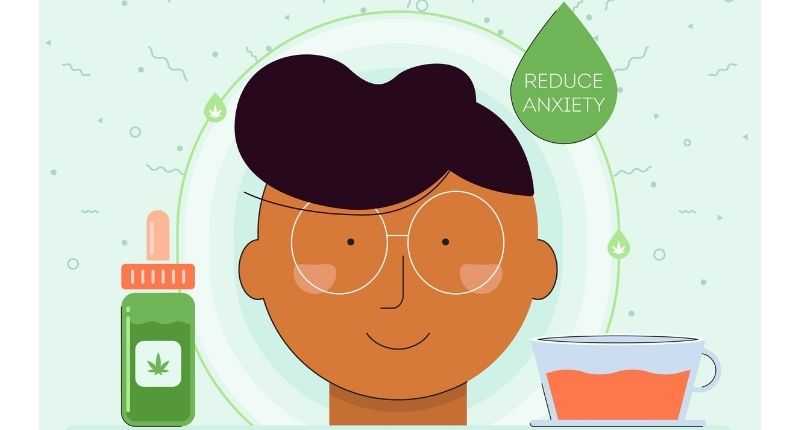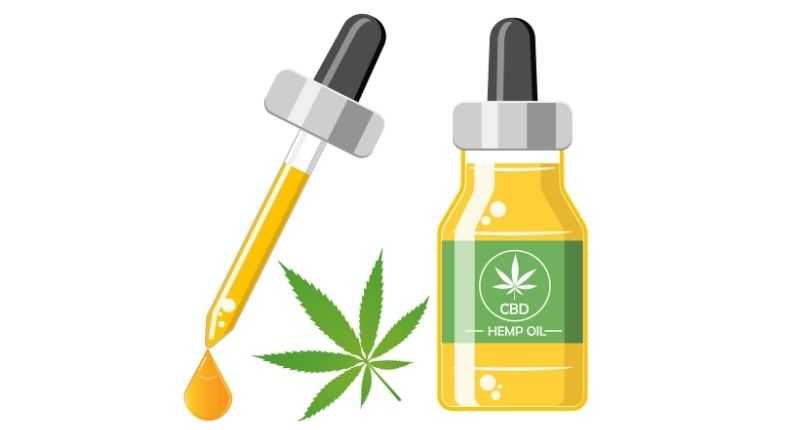CBD is an incredibly promising medicine that has helped countless people deal with anxiety, depression, chronic pain, and much more. Today, we’ll cover how to use CBD oil for anxiety and share all you need to know to decide if a CBD supplement is a smart choice for you.
What Is CBD Oil?
CBD or Cannabidiol is one of nearly a hundred different chemical compounds found inside Cannabis Sativa (marijuana) and hemp plants. These compounds are called cannabinoids, and the most well-known is THC, which is responsible for the highly psychoactive effects of marijuana.
Unlike THC, CBD doesn’t contain any of the toxic elements that are associated with marijuana. In other words, it doesn’t get you high. Research results have shown promising results for CBD products as a treatment for a variety of ailments and health concerns.
Since its popularity exploded in the last few years, people have been turning to CBD to help with everything from chronic pain to anxiety, sleep, depression, and epilepsy. Anxiety, in particular, seems to be responsive to CBD treatments, and there are many ways you can use a CBD product to help reduce or eliminate anxiousness.
Top Tips for Taking CBD Oil for Anxiety

As a promising anxiety treatment, more people are turning towards CBD as a viable alternative to dangerous drugs or prescription medications that don’t seem to be nearly as effective as CBD is. With anxiety and depression skyrocketing in Ireland, partially as a result of the Covid-19 pandemic, finding relief from anxiety is more critical than ever.
While there are many ways to take CBD, most users opt for CBD oil to treat anxiety, as it’s easy to dose and relatively fast-acting. Read on as we cover some tips for maximizing the effectiveness of taking CBD oil for anxiety.
- Take your CBD oil first thing in the morning. Doing so helps get you into a daily routine, and it makes it easier to remember to take your dose each day.
- CBD oil is biphasic, which means that higher or lower doses may cause different effects. Too much CBD oil can exasperate anxiety instead of reducing it, so you must be dosing properly to ensure you receive the optimal therapeutic effects.
- When dosing CBD, take into account the facts that will affect your results. Consider your body weight and metabolism, as well as the strength of the CBD and the severity of your anxiety. There’s no “right” number for dosing CBD. Always start with a low dose and cautiously increase it as necessary.
- Full-spectrum CBD oils, which contain CBD along with other cannabinoids and terpenes, tend to provide the greatest therapeutic effect. For best results, use a low-strength full-spectrum CBD oil.
- Full-spectrum CBD oil is typically more potent than broad-spectrum, which is more potent than isolate. Keep this in mind when selecting and dosing CBD oil.
- CBD oil absorbs best into the bloodstream when taken sublingually, or under the tongue. Hold the dose under your tongue for 90-seconds or more before swallowing to ensure maximum CBD absorption.
- Always use a CBD oil that’s third-party tested to ensure purity and efficacy. Look for brands that provide a certificate of analysis, which gives you a detailed look at what’s inside the bottle.
- Read the label and packaging carefully to develop a full understanding of the product. Confirm the potency of the oil (usually expressed in milligrams per bottle) before taking it to ensure it isn’t more or less potent than you’re expecting.
Read More: CBD Oil Before Surgery: Is it Safe?
How to Use: A Step-By-Step Guide

As promising as CBD oil is as a treatment for anxiety, it may only help you if you take it properly. Selecting a quality CBD oil from a reputable company is also important. The cannabis food supplement market now has many brand options for CBD users to choose from.
Below, we’ll cover everything you need to do to select the right CBD oil and how to dose it for maximum effectiveness. There are now many CBD or hemp oils on offer with CBD levels varying between brands. Read on to find out more about the range of CBD supplements on the world market.
Selecting the Right CBD
As you shop for CBD oil, you’ll come across terms like full-spectrum, broad-spectrum, and isolate. It’s critical to understand the differences between the three products to ensure that you’re selecting the most effective option for yourself.
CBD isolate contains only CBD, with all other cannabinoids and terpenes removed. This form of CBD may be a wise choice for people who are concerned with ingesting THC or other cannabinoids along with their CBD. But, it appears to be the least effective form of CBD for treating anxiety and other ailments.
It’s crucial to understand the entourage effect in regards to cannabinoids. A growing body of research supports the idea that cannabinoids are most effective when you take them along with other cannabinoids and terpenes. Since CBD isolates contain no additional terpenes or cannabinoids, the entourage effect is lost, and isolates are widely considered the least effective form of CBD.
Broad-spectrum CBD oil contains many cannabinoids and terpenes that are absent from CBD isolate, with one notable exception. Broad-spectrum CBD oil does not contain THC, or if it does, it’s contained in such a trace amount that it’s unlikely to have any effect at all.
Broad-spectrum CBD is a wise choice for users who need to avoid THC for personal or professional reasons. This form of CBD is considered to be significantly more effective than isolate.
Full-spectrum CBD contains all of the terpenes and cannabinoids that have been extracted from the plant, including THC. While a full-spectrum product does contain THC, it’s still a small amount that must be below 0.3% to sell legally.
Even that minimal amount of THC allows you to take full advantage of the entourage effect, and full-spectrum products are considered the most effective option.
How to Take
CBD oil is most commonly sold in dropper bottles with dosing measurements printed on the dropper. When taking CBD oil, measure out the appropriate dose and administer it underneath your tongue.
For maximum effectiveness, leave the CBD oil under your tongue for at least 90-seconds before swallowing to facilitate absorption.
Managing Your Dosage
While researchers know a great deal about CBD and how it may be helpful for different conditions, there is little consensus on how to effectively dose CBD. In some studies, test subjects experienced therapeutic benefits when taking a dose as low as 12 mg. Other studies found therapeutic benefits with dosages as high as 300 mg.
The best way to find the appropriate dose for you is to experiment. CBD oil is widely considered to be safe, even at higher doses. So, there’s very little risk associated with experimenting with dosages.
- Measure a 20 mg dose and drop it under your tongue.
- Wait 90 seconds before swallowing the oil.
- CBD reaches maximum therapeutic benefit within two to four hours. Do not take another dose within eight hours of your first.
- If you experience no benefit, increase your dosage in 10 mg increments until you arrive at the most effective dose for you.
Conclusion
CBD continues to be one of the most talked-about wellness products, and it shows incredible promise as a treatment for anxiety, among many other conditions. Before you begin using CBD oil, start by selecting the right CBD oil for you and dosing it as directed. Experiment with your dosage from there until you’ve arrived at the ideal amount of CBD for anxiety for you.
Shannon O’Sullivan
Shannon is a long time CBD user and health writer who has years of experience trying different CBD brands including Dr. Hemp Me, Endoca and more. Sign up for her free newsletter here or visit her Linkedin.

